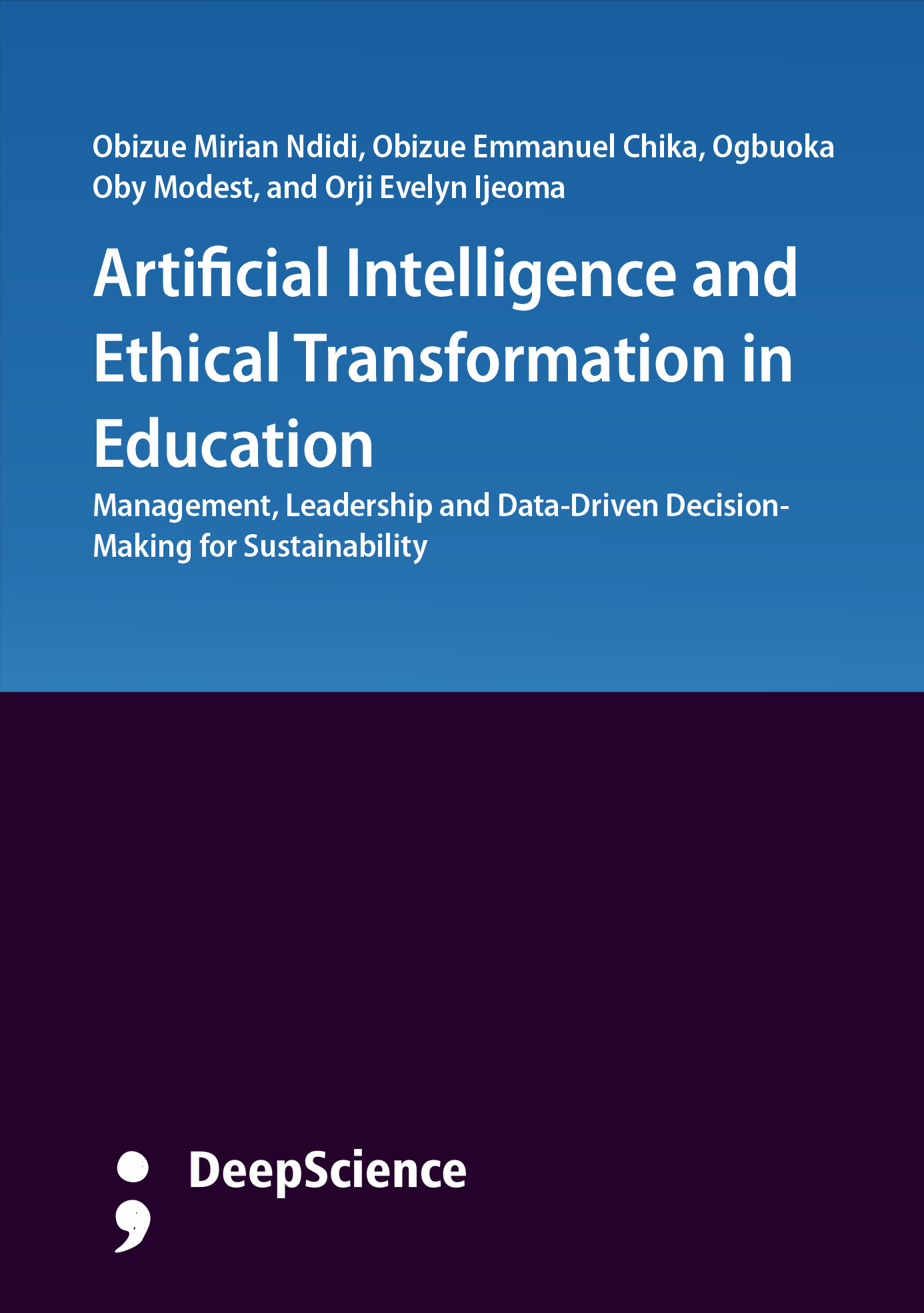Artificial Intelligence and Ethical Transformation in Education: Management, Leadership and Data-Driven Decision-Making for Sustainability
Keywords:
Artificial Intelligence, Ethics, Education, Decision support systems, Sustainability, Explainable AISynopsis
Preface
The accelerated integration of artificial intelligence (AI) into educational systems has transformed the theory and practice of educational management, leadership and decision-making. Once dependent on conventional administrative models, the field now increasingly incorporates data-driven technologies, predictive analytics, and algorithmic decision-making to optimize institutional efficiency and enhance strategic planning. This paradigm shift, however, is accompanied by critical ethical, philosophical, and sustainability concerns that must be rigorously examined if education is to remain an equitable and human-centered enterprise. This edited volume, Artificial Intelligence and Ethical Transformation in Education: Management, Leadership and Data-Driven Decision-Making for Sustainability, is conceived as both a scholarly contribution and a critical intervention. It acknowledges the unprecedented opportunities afforded by AI such as improved transparency in governance, personalization of learning and more effective allocation of resources while interrogating the ethical dilemmas and socio-environmental risks that such technologies entail. Among these challenges are issues of algorithmic bias, digital surveillance, data privacy, ecological footprints of digital infrastructures, and the long-term implications of automating decision-making processes within educational contexts.
The book establishes conceptual and theoretical foundations by situating AI within the frameworks of ethics, values-based leadership, and sustainable development. It further presents empirical studies and practical insights that demonstrate how AI is being implemented across diverse educational contexts, including institutional management, student services, admissions, and curriculum innovation. Finally, projections were made regarding future trajectories that addressed the intersection of Education 5.0, global citizenship, and responsible innovation hence articulating principles for designing AI systems that promote both justice and sustainability. The researchers aim to serve a diverse readership. For academic researchers, it offers critical perspectives and theoretical depth. For practitioners and administrators, it provides practical frameworks for the responsible adoption of AI tools. For policymakers, it presents evidence-based recommendations that balance technological innovation with ethical stewardship. By uniting diverse voices and perspectives, this volume seeks to advance an interdisciplinary dialogue on how AI can be embedded in educational management in ways that are both ethically sound and aligned with sustainable futures. It is our hope that this book contributes not only to scholarly discourse but also to the cultivation of educational ecosystems that are intelligent, just, and enduring. Our hope is that this book helps readers think beyond what AI can do, and instead focus on what AI should do. By placing ethical values and sustainability at the center of this conversation, we aim to encourage the development of educational systems that not only embrace innovation but also honor humanity and protect the planet.
Chapters
-
Conceptualizing Artificial Intelligence in Educational Management
-
Theoretical Perspectives on AI Integration in Educational Institution
-
Digital Transformation and the Role of AI in Modern Education System
-
AI in Strategic Planning and Decision-Making for Educational Leaders
-
The Impact of Artificial Intelligence on Bank Management for Sustainable Economic Growth in Nigeria
-
Data-Driven School Administration: AI Powered Monitoring and Evaluation for Effective Policy and practice
-
Enhancing Human Resource Management in Education through AI Tools
-
Understanding AI Bias in Education
-
The Role of Ethical Leadership in Guiding AI Adoption in Schools
-
Cost-Benefit Analysis of AI Adoption in Educational Management
-
Best Practices for Ethical and Sustainable AI Use in Educational Management
-
Emerging Trends in AI for Educational Leadership and Administration
-
Preparing Future Educational Managers for an AI-Driven World with Ethical Values and Sustainability.
-
Parenting in the Era of Education 5.0 and Artificial Intelligence: Navigating Transformative Landscapes
-
Reflection on AI and Impact on Cognitive Development: Implications for Sustainable Education
References
Binns, R. (2018). Fairness in machine learning: Lessons from political philosophy. Proceedings of the 2018 Conference on Fairness, Accountability and Transparency, 149–159.
Eynon, R. (2021). The digital divide in education: Exploring the implications of AI-based learning. Oxford Review of Education, 47(4), 529–544.
Holmes, W., Bialik, M., & Fadel, C. (2022). Artificial Intelligence in Education: Promises and Implications for Teaching and Learning. Center for Curriculum Redesign.
Luckin, R., Holmes, W., Griffiths, M., & Forcier, L. B. (2016). Intelligence Unleashed: An Argument for AI in Education. Pearson.
Ng, W. (2015). New Digital Technology in Education: Conceptualizing Professional Learning for Educators. Springer.
Obizue M.N, Enomah S & Onyebu N (2025). Ethical Leadership and Moral Decision-Making. Educational Management, Leadership and Supervision: Contemporary Perspective. (Ed). Obizue et al. Deep Science Publishing. https://doi.org/10.70593/978-93-7185-247-0.













